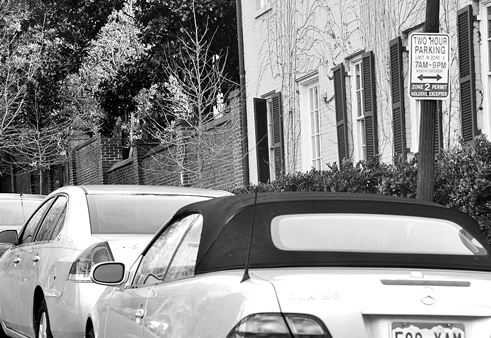Agency Still Seeking Visitor Parking Reform

By Brady HoltCurrent Staff Writer
The D.C. Department of Transportation is defending several planned reforms to its visitor parking pass program, which were unanimously struck down by the D.C. Council last week.
The Transportation Department had hoped to make the passes available only by request, and to imprint them with scannable “QR” codes that would tell parking enforcement officers who owns the pass and where it’s authorized to be used.
But those changes were overshadowed by a larger proposal to expand the program citywide — which drew strong objections from several densely populated neighborhoods, where residents decried a “one-size-fits-all” approach.
The agency now agrees that an expansion of the program would have been unwise. “We went through a comment period with the public, and one of the recommendations we got and one of the things we agree with is not going citywide,” agency spokesperson Reggie Sanders said in an interview yesterday.
Residents who already have a pass can use it through December — despite a printed Sept. 30 expiration date — while the agency establishes how best to move forward.
But the Transportation Department is still hoping to salvage the other aspects of its planned visitor parking reforms after the council’s emergency legislation, he said. “We were ready, set, go on our initial plan to roll this thing out, but then the world changed,” said Sanders.
The visitor parking pass program has been generally popular in wards 3 and 4, where it primarily serves to eliminate the hassle of going to a police station for a temporary pass. A visitor permit good for 12 months is currently mailed automatically to every eligible household, which includes most streets in those two wards along with certain neighborhoods elsewhere in the city.
But several Ward 2 advisory neighborhood commissions voted to oppose the passes. Many residents there argued that the program would invite more cars to compete for scarce parking resources, and that the passes would be valuable enough to induce fraudulent use.
According to Sanders, the new accountability measures — requiring a resident to register to receive the pass, and enabling parking enforcement officers to view that registration information — would help curb fraud and abuse anywhere in the city.
“We want to make sure that the people that are using these passes are legitimate,” he said. “Sending these out willy-nilly is not the best way to do that. … The way the council is asking us to do it, we have no idea who’s receiving them and how they’re using them.”
In addition to protecting against residents selling or giving the passes to commuters, the QR codes would let the city enforce the prohibition on use of the passes outside the boundaries of their appropriate advisory neighborhood commission. Sanders said right now residents are generally able to use the passes anywhere in their ward because it’s too difficult to tell whether a car is parked in the correct location.
Ward 4 Council member Muriel Bowser, who authored last week’s emergency legislation to reject the reforms, didn’t respond to a request for comment yesterday. In deliberations about her legislation last week, she questioned why the Transportation Department was trying to fix a program that’s “not broken now.”
Sanders said it’s too early to promise changes to visitor parking passes, but “it’s a reasonable expectation” that there will be some degree of reform when new passes are next issued. “DDOT’s mandate is to add intelligence to the VPP program and we are committed to doing that,” he wrote in an email.
This article appears in the Sept. 25 issue of The Georgetown Current newspaper.
